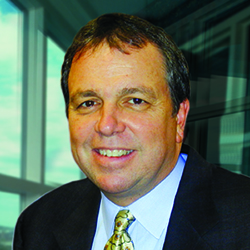UA Appoints Senior VP for Health Sciences
Michael D. Dake, MD, an internationally recognized physician-scientist, health educator and innovative medical researcher, has been appointed senior vice president for health sciences at the University of Arizona.

"I am excited about the appointment of Dr. Dake to this important leadership position at the University of Arizona," said UA President Robert C. Robbins. "Mike is a pioneer, recognized internationally in the field of interventional radiology, with whom I was privileged to work for over two decades at Stanford University. Mike's visionary leadership style will facilitate our partnership with Banner Health and prepare the Health Sciences Center to be a global leader in improving the health of humanity."
Dake currently serves as Stanford University's Thelma and Henry Doelger Professor of Cardiothoracic Surgery. He made medical history in 1992 with the implantation of the world's first thoracic stent-graft at Stanford, the first aortic stent-graft done in the U.S.
As the UA senior vice president for health sciences, Dake will lead the integration of undergraduate and graduate education, research and clinical activities among the UA health colleges and their clinical partners. The UA Health Sciences include the College of Medicine – Tucson; College of Medicine – Phoenix; College of Pharmacy; College of Nursing; the Mel and Enid Zuckerman College of Public Health; and the UA Cancer Center. Dake will be part of the senior executive team for the University and will report directly to Robbins.
"It is an honor to join the University of Arizona at such an exciting time in its distinguished history. With five health colleges and a strong partnership with Banner Health, the UA is positioned to emerge as a transformative force in medical education, patient care and the health sciences," Dake said. "I look forward to working with the talented students and world-class faculty and staff on a new era of multidisciplinary research and leading-edge initiatives to benefit not only the people of Arizona, but the future of global health care."
In addition to his academic appointment at Stanford, Dake directs the Catheterization and Angiography Laboratories at Stanford Medical Center. He also served as chair of the Department of Radiology and Medical Imaging and the Harrison Distinguished Medical Teaching Professor at the University of Virginia Health System from 2005-2008.
Dake has an international reputation for revolutionary work in improving vascular health to help treat debilitating diseases. He has published more than 300 peer-reviewed articles and more than 100 book chapters. His publications in Nature Medicine have been cited more than 1,000 times, and his papers in the New England Journal of Medicine have been referenced more than 1,500 times. Overall, the impact of Dake's contributions to the medical literature have earned more than 30,000 citations, which puts him among the top scientists in his field. He holds 31 U.S. patents and has founded five companies.
Dake is a graduate of Harvard College, where he was voted First Class Marshal by his graduating class, and Baylor College of Medicine, where he completed an internship, residency and chief residency in internal medicine. He is board-certified in internal medicine, pulmonary disease, diagnostic radiology, as well as vascular and interventional radiology.
Media Contact
Chris Sigurdson
UA Communications
Phone: 520-626-9422
Topics
About the College
Founded in 2007, the University of Arizona College of Medicine – Phoenix inspires and trains exemplary physicians, scientists and leaders to advance its core missions in education, research, clinical care and service to communities across Arizona. The college’s strength lies in our collaborations and partnerships with clinical affiliates, community organizations and industry sponsors. With our primary affiliate, Banner Health, we are recognized as the premier academic medical center in Phoenix. As an anchor institution of the Phoenix Bioscience Core, the college is home to signature research programs in neurosciences, cardiopulmonary diseases, immunology, informatics and metabolism. These focus areas uniquely position us to drive biomedical research and bolster economic development in the region.
As an urban institution with strong roots in rural and tribal health, the college has graduated more than 1,000 physicians and matriculates 130 students each year. Greater than 60% of matriculating students are from Arizona and many continue training at our GME sponsored residency programs, ultimately pursuing local academic and community-based opportunities. While our traditional four-year program continues to thrive, we will launch our recently approved accelerated three-year medical student curriculum with exclusive focus on primary care. This program is designed to further enhance workforce retention needs across Arizona.
The college has embarked on our strategic plan for 2025 to 2030. Learn more.